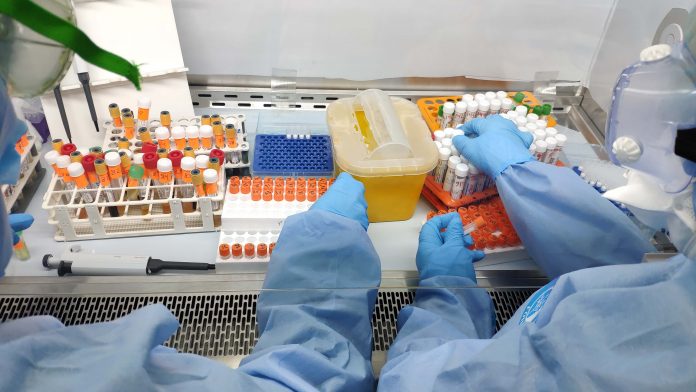
There was much confusion and angst over an April 8 order of the Supreme Court asking labs, be it approved government ones or private ones, to make tests for Covid-19 free. This followed a writ petition by Advocate Shashank Deo Sudhi who sought a direction for ensuring free test of Covid-19 by all labs.
However, on April 13, following two separate petitions by Dr Kaushal Kant Mishra and Bijon Kumar Mishra that were heard together, the Court clarified that its earlier order was only for people who couldn’t afford the Rs 4,500 testing fee as fixed by ICMR for private labs. It added that it never intended to make testing free for those who could afford it.
The Court’s latest order said: “We make it clear that the benefit of free testing by a person can be availed only when he or she is covered under any scheme like Ayushman Bharat Pradhan Mantri Jan Arogya Yojana. We are also of the view that looking to the plight of persons belonging to economically weaker sections of the society, the Government may consider as to whether any other categories of persons belonging to economically weaker sections of the society can be extended benefit of free testing of COVID-19.”
However, following the April 8 order, many labs such as Dr Lal PathLabs and Max Labs started offering free testing, even as a debate around judicial activism and judicial overreach surfaced. The main point of contention by the industry was that along with the costs of PPE kits for doctors and testing kits, there were other expenses too. Some wanted reimbursement of only the cost of tests or a percentage of the amount being spent immediately. Free tests, they said, were unsustainable in the long run and could adversely affect the number of tests being conducted across the country and would be a setback in the fight against Covid-19.
Dr Arjun Dang, CEO of Dr Dangs Lab, told India Legal that the costs of tests could be put in three categories:
- Pre-analytical Costs: These include the cost of PPEs (coveralls, goggles, face shields, gloves, shoe covers, N95 masks). The entire set needs to be changed before every sample is taken. Then there are swabs (nasopharyngeal and oropharyngeal samples) to be taken, viral transport media for preserving samples, infection-control protocols such as triple layer packaging of the sample, logistics such as pay-out to the technician collecting the sample and cost of cars with cold chain maintenance devices and temperature loggers.
- Analytical Costs: The kits approved by ICMR are a selected few and include the following—primers, probes, master mix, RNAse P, etc. The cost of these kits along with the RNA extraction would be one of the major costs that are incurred. A GST is also levied on the kit costs. Trained personnel (MDs, PhDs, lab staff) and the cost of their PPEs add to the costs. Analytical costs would also include the equipment and infrastructure that goes into setting up a Biosafety Level 2 facility and maintaining it. For this process, the lab has taken certain measures for the highest levels of infection control protocols. These include a dedicated elevator to carry Covid-19 samples.
- Post-analytical Costs: These include biomedical waste (BMW) processes for which stringent training is required and several consumables. This is a cumbersome procedure along with payout to certified BMW vendors who specialise in infectious waste management. There are also data entry teams which update the ICMR and state health authorities’ portal once reports are ready. These all add to the costs of labs. Covid-19 sampling and testing also mandate the highest levels of sanitation and disinfection protocols.
Dr Dang also launched India’s first drive through sample collection facility for Covid-19. In addition, there are home collection services and from designated areas in hospitals. All bookings and documents are submitted online on their website prior to confirmation so as to ensure a paperless and cashless process to eliminate any contact. All tests prior to the ruling were performed for Rs 4,500 as mandated by the government.
Dr Kaushal Kant Mishra in his petition said that if the government didn’t provide immediate reimbursement to private labs, there would be a real risk that they would stop testing for Covid-19 and there could be a severe spike in the coming weeks. He said this was the point at which testing capacities must be at their maximum so that the government’s efforts to contain its spread could be maintained.
While listening to his appeal, the Supreme Court bench of Justices Ashok Bhushan and S Ravindra Bhat clarified the April 8 order. It also gave further direction that “the Government of India, may issue necessary guidelines for reimbursement of cost of free testing of COVID-19 undertaken by private Labs and necessary mechanism to defray expenses and reimbursement to the private Labs”.
This came as a breather to diagnostic labs as the April 8 order had stated that “the apex court will consider later whether private laboratories are entitled to any reimbursement of expenses”.
The Court also directed the Ministry of Health and Family Welfare that it “may consider as to whether any other categories of the weaker sections of the society e.g. workers belonging to low income groups in the informal sectors, beneficiaries of Direct Benefit Transfer, etc. apart from those covered under Ayushman Bharat Pradhan Mantri Jan Aarogya Yojana are also eligible for the benefit of free testing and issue appropriate guidelines in the above regard also within a period of one week”.
Due to the changing nature of this pandemic, courts too have had to change their decisions accordingly. As long as it is for the larger good of patients, no one will complain.
Lead picture: UNI

